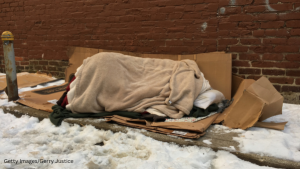Life, Liberty, Property #44: My bold prediction for 2024 is that the Left will keep trying to make us equal, even if it makes us equally unhappy.
By S.T. Karnick
IN THIS ISSUE:
- My Bold Prediction for 2024
- Congress Considers Reform to Help Homeless, Addicts
- Crime Havens and Food Deserts
- Cartoon
SUBSCRIBE to Life, Liberty & Property (it’s free). Read previous issues.

My Bold Prediction for 2024
Here we are in a shiny new year, and it is time for policy analysts and others to make their predictions about what is going to happen in the next twelve months.
Unfortunately, I do not know what is going to happen. The biggest reason for that ignorance is the fact that the people who control things do not yet know what they are going to do.
“The people who control things” are generally the people who control money. They are largely of the modern-day Left, which might come as a surprise to people who have not been paying attention to current events during the past two decades.
In America today, substantive action is generally initiated by the progressive Left. The Left acts, and the Right reacts. That is the basis for the characterization of the two positions as liberal and conservative, respectively. That characterization is inaccurate as it applies to the Left, however, as the increasing illiberality of its positions makes obvious: support for censorship, racial advantage, sex discrimination, political and sexual indoctrination of other people’s children, suborning of criminal activity, refusal to help the mentally ill without their expressed consent, etc.
The essential difference between the two mindsets is this: the Left acts, and the Right reacts. The Left operates like an amoeba, always reaching out toward another goal. When the Right blocks its progress, the Left reaches out in another direction, and when the Right moves to block that advance, the Left reaches out in another direction, possibly the one the Right most recently blocked and has just abandoned to close off the Left’s new initiative.
The goals of the Left are always clad—or shrouded—in a call for greater equality. From the French Revolution to the Bolshevik Revolution to the present day, the Left has continually called for the remaking of society to destroy the corrupt institutions that are presumed to have created the inequality.
Regardless of whether reduction of inequality is a sincere goal or merely a pretext for power-grabs (or both), the pursuit inevitably leads to oppression. Inequality is a natural outcome of human variety and diversity. The only way to reduce it by force is via suppression of excellence. The latter includes, importantly, excellence of character. Good character is associated with good outcomes. Good character is the foundation of human flourishing.
That helps explain why the initiatives of the Left tend to undermine the development of positive traits of personal character—such as probity, thrift, courage, honesty, temperance, modesty, patience, liberality, magnanimity, friendliness, proper ambition, and devotion to what is right.
For example, the national-scale attempt to give all children an equal start in life, via the welfare state, has undermined personal character by removing fathers from homes and weakening the connection between effort and reward. The reluctance to acknowledge natural differences between human males and females has progressed from “equal pay for equal work” to a war on masculinity. Efforts to treat criminals as victims of oppression—morally equalizing them with their own victims, when not in fact elevating those perps above their prey—increase crime rates and reduce the availability of goods and services to those living in crime-ridden areas, further expanding the number of victims.
On a global scale, the attempt to explain away differing outcomes on the societal level stirred up decades of open hatred for Western civilization (once better known as Christendom), the anticolonialism movement, and now the open Hamasification of the Left in the United States, Europe, and much of the rest of the so-called developed countries. The premise that people born in other countries should have access to U.S. residency and even citizenship equal to those born in America has led to an unprecedented crisis on the U.S. border with Mexico and the admission into the Unites States of numerous criminals and human traffickers alongside those honestly seeking a better life.
Such destruction is the inevitable outcome of the overweening pursuit of equality. The Left still chases after that ever-elusive goal, even as its actions destroy the foundations of a civilization which has given to today’s lowest-income residents of developed countries luxuries of which kings in former times could not even dream. To oppose the mad rush toward forcible destruction of human activities that result in natural inequality is to be on the “wrong side of history.”
Inequality is not, however, an artifact of history. Inequality develops through both natural means and unnatural ones. The unnatural means—forced efforts to reduce inequality—are a matter of human choices and can therefore be avoided. The assault on inequality, now more than two centuries old in Western civilization, aggravates the very thing it is intended to solve. That may be the right side of history, but it is the wrong thing for human beings.
As the actions taken to promote equality create more inequality and social chaos, the Left presses for further action to solve the problems it created. Identification of ever-more instances of inequality incites further panicked action to remediate them, thus creating more problems and unhappiness, and fevered calls for new remedies. The continual failure to solve the problems created by the pursuit of equality ultimately creates hatred toward one’s nation and, soon enough, toward one’s fellow citizens.
That is not a strategy; it is a self-perpetuating mechanism of destruction of all natural human endeavors, enterprises, and institutions. That is why we cannot predict what the Left will do, now or ever. They don’t know what will offend them next and what disasters their own actions will cause.
All we can confidently predict is that the outcomes will be awful, unnatural, and highly destructive.
 Congress Considers Reform to Help Homeless, Addicts
Congress Considers Reform to Help Homeless, Addicts
A classic case of a well-meaning government action creating an appalling disaster is the 1960s effort to spur more-humane treatment of mental illness by pushing people out of large institutions.
Retired business professor Mike Landry tackles this issue in The Western Journal:
And then there’s the running away from obligations to protect the mentally ill from themselves and from society.
Perhaps you’ve had the same thoughts as I—the grand experiment in mental health care of the past half-century or so has failed.
Just witness the aggressiveness of babbling panhandlers, the general filth of helpless people living on the sidewalks, the destruction of cities such as San Francisco.
Congress is finally considering action, Landry notes: “Bills favoring involuntary commitments are making progress in both the U.S. House and Senate, of which Politico writer Carmen Paun said, ‘Republicans in Congress agree. Democrats are divided.’”
Democrats are strongly conflicted about the proposed reforms. While seeing forced care for the mentally ill as discriminatory and worrying about institutionalization putting a “stigma” on the patients, Democrats recognize that the mentally ill are undermining the quality of life in the cities Democrats run and are thus damaging the urban leaders’ political prospects, as Landry notes:
The fact that some Democrats are willing to go along with a Republican push for involuntary commitment would seem shocking, but remember it’s Democrat-run cities and states that are suffering the most from homelessness based on mental illness.
And the Democrats are beginning to see political pushback to their laissez-faire attitudes toward sick street people.
Which means even lefties like New York Mayor Eric Adams and California Gov. Gavin Newsom are promoting some forms of mandatory incarceration, according to Politico.
The major impediment to help for those among the mentally ill who cannot stick to treatment programs on their own is Medicaid, as Landry notes:
Undercutting the original large mental health operations was the 1965 prohibition against using Medicaid for treating patients there. That followed advocacy in 1963 by then-President John F. Kennedy to replace the big hospitals with community-based mental health centers.
The new rules prohibited Medicaid from [being used for] mental health facilities larger than 16 beds.
Unfortunately, the system Kennedy idealistically expected to arise did not get the expected funding, and the residents of the institutions were thrown out and left to their own devices as the operations were shut down. “Many state hospitals closed but the community mental health system, as Kennedy envisioned it, never came to fruition, advocates on both sides of the debate say,” Politico reports. A great many of these individuals could not take care of themselves and required more help than family, friends, and nonprofit organizations could provide. They ended up on the streets.
The dismal results of this foolish and inhumane deinstitutionalization have led to a reform movement, after a mere six decades. Landry writes,
But now, with many urban streets awash with people seriously debilitated by mental illness and addictions, there are calls on many sides for reform.
The first step is rescinding the rule against larger mental health facilities. A measure to do that was approved by the House on Dec. 12 and by the Senate Finance Committee in November, and prospects for passage are considered good, according to Politico.
The reformers are certainly not advocating warehousing the mentally ill in places where they would be “subject to abuse and starvation in formidable prison-like facilities, as outlined in a 1946 Life magazine article,” Landry notes. In fact, a cosponsor of the bill to lift the Medicaid exclusion, Rep. Ritchie Torres (D-NY), had been hospitalized for mental health problems in the past, Landry reports. The bill passed the House in a package by a vote of 386-37.
Unfortunately, that bill would only “give states the option to treat Medicaid patients suffering from addiction for up to a month in a mental hospital on the government’s dime,” as Politico puts it. That does nothing for non-addicts or for troubled people who cannot somehow be fully cured within a month. To help those most in need and get them off the streets and other public places, Congress should repeal the Medicaid exclusion altogether.
Sources: The Western Journal; Politico
 Crime Havens and Food Deserts
Crime Havens and Food Deserts
In LLP #43, I wrote about how our liberties rely on the rule of law. An article that ran in The Wall Street Journal on Friday illustrates that point well. “The looting of [a] Los Angeles-area bakery is a case study in the reason there are ‘food deserts’ in U.S. cities,” the article notes:
The chaos began early Tuesday when a vehicle backed through a security gate into Ruben’s Bakery & Mexican Food, a local shop known for its bolillo bread rolls. A mob of more than 100 then rushed into the store, stealing groceries, lottery tickets and even meat scales, and causing further damage.
The pillaging was preceded by a street takeover, where lawbreakers block off intersections and hold street races and other spectacles of reckless driving. Street takeovers surged after the pandemic in and around Los Angeles and continue to plague Compton.
These “street takeovers” are an increasingly common fact of life in the City of Angels, the story notes:
Inherently lawless, the takeovers are often accompanied by other crimes. During one eight-month stretch in 2022 at least six people died in crashes and shootings during the takeovers in the Los Angles area, the L.A. Times reported. Last April another large mob of looters targeted a Compton gas station after a similar illegal shutdown of city streets.
The Los Angeles Sheriff’s Department did not reply to our inquiry by deadline Thursday. But earlier this week the local press reported that no one had been arrested in connection with the ransacking of Ruben’s.
The story reports state and local police say they “lack the staffing to safely stop” these takeovers and “officers have sometimes been ‘discouraged from pursuing suspects in the interest of public safety.’” The story does not identify those who have done this discouraging. It seems safe to assume that this includes local politicians and advocacy groups. In addition, the story notes, “Theft of less than $950 is a misdemeanor in California—if it is prosecuted at all.” That implicates the state government, of course. There is also the deleterious effect of Soros-backed district attorneys who refuse to prosecute crimes they consider justified because of the race of the perpetrator, if we’re going to be honest about it.
The neglect of the government’s fundamental duty to protect people’s life, liberty, and property from depredations by others has undermined the quality of life in the nation’s urban areas, the story notes:
Progressives often complain about “food deserts” in cities that they say are the result of racism. But here is local small business that braves a rough neighborhood and is rewarded with looting and destruction. Food deserts follow where there are law-and-order deserts.
The bizarre, utopian refusal to prosecute crimes has caused a massive migration out of the places that have adopted it most fully. Sympathy for the criminal breeds contempt for the law-abiding.
Source: The Wall Street Journal
Cartoon

via Comically Incorrect












 EV Dangers Daily Becoming More Evident...
EV Dangers Daily Becoming More Evident...